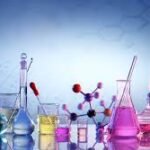Chemistry and Nanotechnology: Unleashing the Power of the Small
Welcome to our website dedicated to the dynamic fusion of chemistry and nanotechnology. Chemistry plays a pivotal role in the development and advancement of nanoscale materials and devices, enabling groundbreaking applications across various fields. Join us as we explore the exciting world of chemistry and nanotechnology, uncovering the transformative potential and cutting-edge advancements that are shaping the future.

- Nanomaterial Synthesis: Chemistry is at the forefront of nanomaterial synthesis. Chemists design and synthesize nanoparticles, nanowires, and nanofilms with precise control over size, shape, and composition. These nanomaterials exhibit unique properties and functionalities that can be tailored for specific applications, including electronics, medicine, and energy.
- Nanodevices and Nanosensors: Chemistry enables the development of nanoscale devices and sensors. Chemists work on fabricating nanoelectronics, nanocircuits, and nanosensors that exhibit remarkable sensitivity and responsiveness. These devices find applications in electronics, environmental monitoring, and medical diagnostics.
- Nanomedicine: Chemistry drives advancements in nanomedicine, revolutionizing diagnostics and therapeutics. Chemists design nanoparticles for targeted drug delivery, develop nanoscale imaging agents, and engineer nanomaterials for tissue engineering. These advancements hold great promise for personalized medicine and improving treatment outcomes.
- Nanotechnology in Energy: Chemistry contributes to nanotechnology applications in energy generation and storage. Chemists develop nanomaterials for solar cells, fuel cells, and batteries, enhancing efficiency and performance. These advancements pave the way for renewable energy solutions and the transition to a sustainable future.
- Nanofabrication Techniques: Chemistry plays a crucial role in nanofabrication techniques. Chemists develop processes such as lithography, self-assembly, and molecular templating to precisely manipulate and assemble nanoscale structures. These techniques enable the fabrication of intricate nanostructures with unprecedented control.
- Environmental Nanotechnology: Chemistry contributes to environmental nanotechnology, addressing environmental challenges through innovative solutions. Chemists develop nanomaterials for pollution remediation, water purification, and air filtration. These nanomaterials exhibit enhanced adsorption and catalytic properties, promoting a cleaner and healthier environment.
- Safety and Ethical Considerations: Chemistry takes into account the safety and ethical considerations in nanotechnology. Chemists work on understanding the potential risks associated with nanomaterials and develop guidelines for their safe handling and disposal. They also actively engage in ethical discussions to ensure responsible and sustainable development of nanotechnology.
At our website, we explore the dynamic fusion of chemistry and nanotechnology, uncovering the principles, applications, and advancements that are driving innovation at the nanoscale. Join us as we delve into nanomaterial synthesis, nanodevices and nanosensors, nanomedicine, nanotechnology in energy, nanofabrication techniques, environmental nanotechnology, and safety and ethical considerations. Welcome to a place where chemistry and nanotechnology converge to unlock the vast potential of the small.

